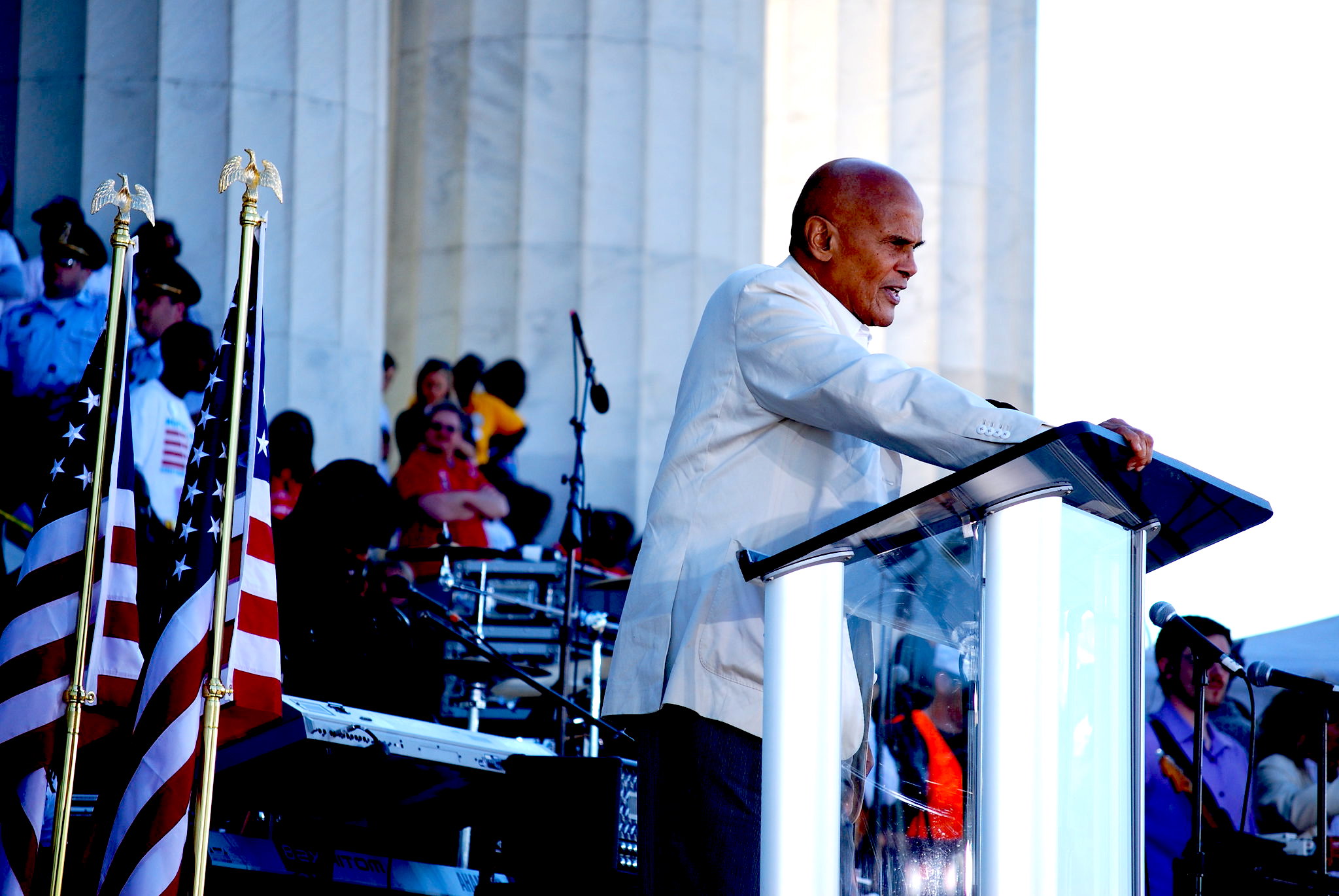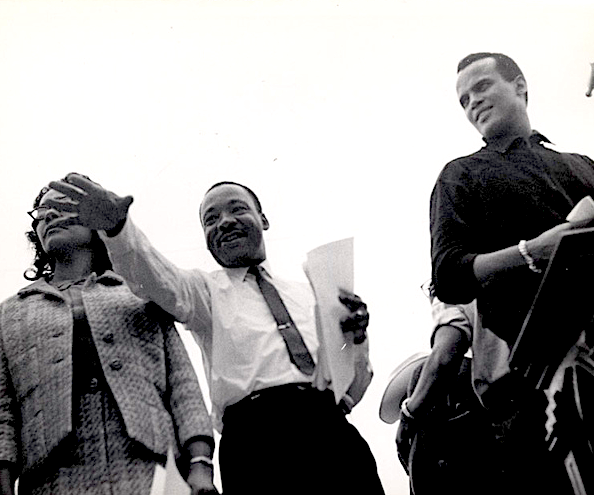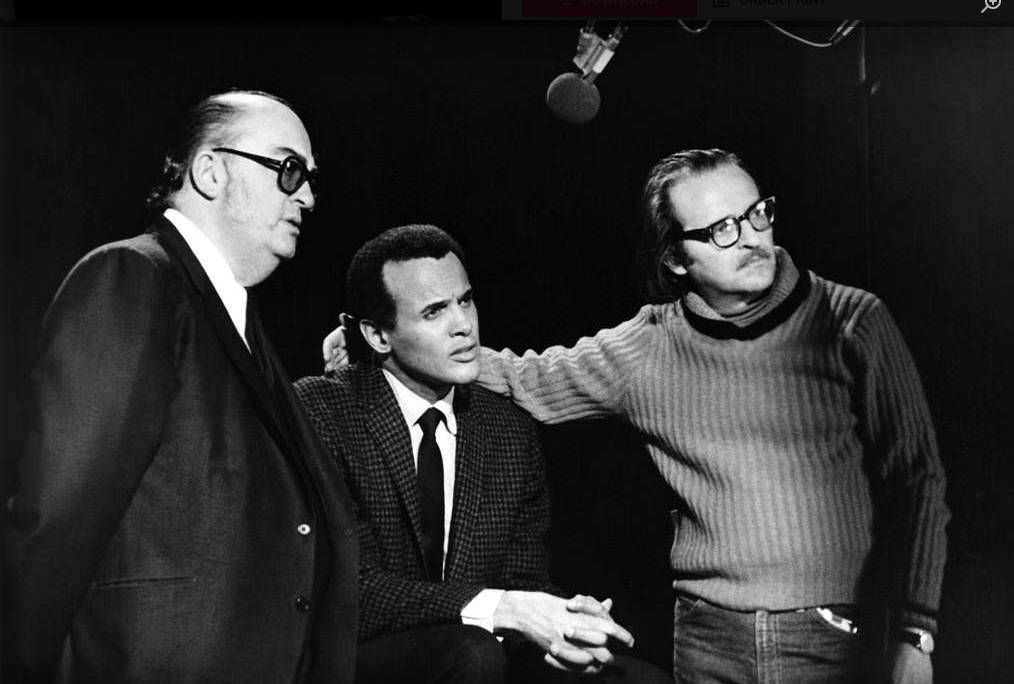Both the late singer and his close friend Martin Luther King Jr. saw their civil rights advocacy as the cutting edge of a still broader struggle for equality, writes Sam Pizzigatti.

Harry Belafonte reading a historical Cesar Chavez speech in 2010. (The Leadership Conference on Civil Rights, Flickr, CC BY-NC 2.0)
By Sam Pizzigati
Inequality.org
![]() Those of us just 8 years old back in 1956 didn’t know the amazing stats of Harry Belafonte’s sudden and smashing musical success. We didn’t know, for instance, that his record album entitled Calypso had become the first album by a single artist ever to sell over a million copies. But we did know Harry Belafonte. His music and voice seemed to be coming at us from everywhere.
Those of us just 8 years old back in 1956 didn’t know the amazing stats of Harry Belafonte’s sudden and smashing musical success. We didn’t know, for instance, that his record album entitled Calypso had become the first album by a single artist ever to sell over a million copies. But we did know Harry Belafonte. His music and voice seemed to be coming at us from everywhere.
“Day-o!” we kids would warble. “Daylight come and we want go home.”
Belafonte, unlike other stars of that era, never did fade away, and Tuesday, right after his death, almost every major U.S. media outlet immediately began running glowing appreciations of his remarkable career. The obituaries all saluted his artistry and his commitment to social justice.
From the late 1950s onward, as The New York Times obit would note, Belafonte would be far more than a superstar. Year after year, he put “his primary focus” on “civil rights,” the “quest for racial equality,” doing everything from bailing out jailed activists to helping organize the landmark 1963 March on Washington.

Martin Luther King, Jr., center, with Harry Belafonte on right, near podium at Montgomery March, 1965. (American Jewish Historical Society, picryl, Public domain)
But both Belafonte and his close friend Martin Luther King Jr. saw their civil rights advocacy as the cutting edge of a still broader struggle for equality.
At one activist gathering in Belafonte’s New York apartment, his memoir My Song would later relate, the assembled activists heard Dr. King give that broader struggle an evocative frame.
“I’ve come to believe,” the Rev. Dr. King told the group, “that we are integrating into a burning house.”
Given that reality, Belafonte asked King, what should activists be doing? King’s reply: “I guess we’re just going to have to become firemen.”
And that meant confronting what King would call the interrelated “triple evils” of racism, economic exploitation and war. The civil rights movement, he told the 1967 Southern Christian Leadership Conference convention, “must address itself to the question of restructuring the whole of American society” because any society that “produces beggars needs restructuring.”
This restructuring, King stressed, would require asking questions about our economic system, about what we can do to create “a broader distribution of wealth.” Belafonte would help raise those questions at every opportunity, never more cogently than in an interview he gave the music industry’s Billboard magazine in 2020.

Harry Belafonte, center, in a publicity shot for the 1970 documentary “King: A Filmed Record… Montgomery to Memphis;” producer Ely Landau to left, director Sidney Lumet on right. (Public domain)
“America has more money than any other single country or civilization has ever been able to amass,” Belafonte observed. “We have the most powerful army in the world.”
“How is it in contrast to that we also have the largest prison population in the world?” he went on. “How is it that we have so much unemployment? How is that we have so much need in education?”
Who, Belafonte would ask, is getting all the money that abounds in our “great nation?” We must insist, he answered, on more than “an accounting.” We need to “redistribute how wealth is given to the people who have done so much to earn that wealth.”
That redistribution will require, Belafonte had earlier told a Ford Foundation conference, more than begging philanthropies for help. Belafonte, as columnist Charles Blow points out, saw philanthropy — and its failure to fund the “real change makers” — as “a big part of the problem.”
The last thing MLK told Harry Belafonte pic.twitter.com/qlfuNmyXIh
— Matt Orfalea (@0rf) April 27, 2023
Belafonte had equal scorn for those from communities in need who “surrendered to greed” and “ran off to the feast of Wall Street and big business.” And still more scorn for those elected into office who accepted our deeply unequal core realities and “suffocated radical thinking.”
Let us all smile when we remember Harry Belafonte’s wondrous art. Let us, even more importantly, take inspiration from his life-long struggle for a more equal tomorrow.
Sam Pizzigati co-edits Inequality.org. His latest books include The Case for a Maximum Wage and The Rich Don’t Always Win: The Forgotten Triumph over Plutocracy that Created the American Middle Class, 1900-1970. Follow him at @Too_Much_Online.
This article is from Inequality.org.
The views expressed are solely those of the authors and may or may not reflect those of Consortium News.

Alas…a vanishing species.
Jimmy Dore and Aaron Mate on YouTube replayed Belafonte DESTROYING HRC, Obama and their wretched party at a Dems conference back in 2007, when he quoted Dr King’s burning building observation. He must have been disgusted at Obama’s record in office. In any case he was fearless. Like the writer, I had no idea Belafonte was such a leading figure in the civil rights movement – and a hero, full stop – until many years down the line from “Day-Oh” etc.
Remember his music from childhood. Songwriter / musician myself… consider all overhearing Mom’s top 40 local radio an influence on both.
Ironic personalities featured in clip…
Right makes might?
Don’t forget Fight!
Harry Belafonte was a “household” name in the UK in the 50’s/60’s. We loved all the Calypso music. I was unaware of his activism during that time. Probably that side of him didn’t make it across the “pond”; or it just wasn’t discussed. But i appreciate all he has done for justice and music.
Belafonte, like King, Malcolm X and Mohammed Ali, was a giant in the struggle to bend the Arc of History toward justice. The world is a poorer place without him. Meanwhile, the Bidens, Nulands, Boltons and Blinkens continue to drag us toward a vicious future.
“Meanwhile, the Bidens, Nulands, Boltons and Blinkens continue to drag us toward a vicious future.”
There appears to be a “vicious” competition Bill; it’s odds or even whether we annihilate ourselves with nuclear weapons or climate breakdown. It’s neck and neck run now. Could be a photo finish.